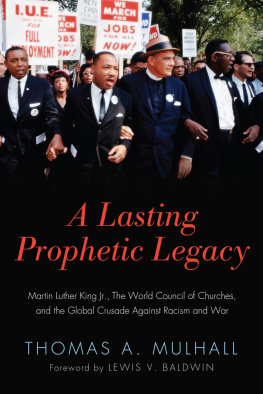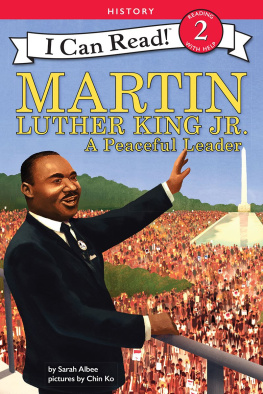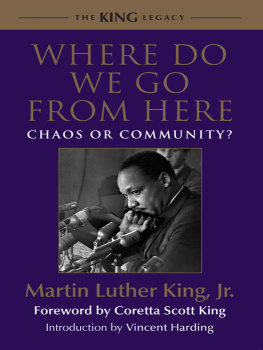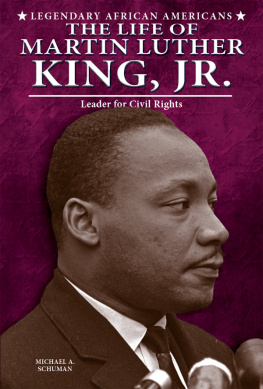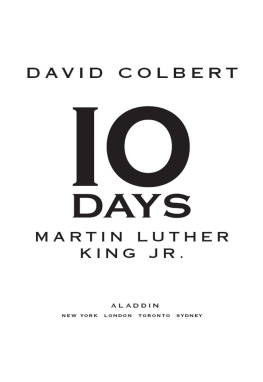A Lasting Prophetic Legacy
Martin Luther King Jr., the World Council of Churches, and the Global Crusade Against Racism and War
Thomas A. Mulhall
A Lasting Prophetic Legacy
Martin Luther King Jr., the World Council of Churches, and the Global Crusade Against Racism and War
Copyright 2014 Thomas A. Mulhall. All rights reserved. Except for brief quotations in critical publications or reviews, no part of this book may be reproduced in any manner without prior written permission from the publisher. Write: Permissions, Wipf and Stock Publishers, W. th Ave., Suite , Eugene, OR 97401 .
Wipf & Stock
An Imprint of Wipf and Stock Publishers
W. th Ave., Suite
Eugene, OR 97401
www.wipfandstock.com
ISBN : 9781 - 6203 2753 -
eISBN : 9781 - 6308 7342 -
Manufactured in the U.S.A.
To Mary, Aoife, and Thomas Jr.
Foreword
T he adjective global is increasingly associated with the name, life, and activities of Martin Luther King Jr. The world in which King lived was, due to scientific and technological revolutions, becoming increasingly smaller, and his familiarity with that world was such that he variously labeled it a global village, the world house, and the worldwide neighborhood. In view of this rapidly shrinking global scene, King hoped that people in America and abroad would develop a more explicit and enlightened world perspective, and that the Christian church, in particular, would become a force in strengthening the spectrum of social justice and the advancement of human rights and democratic freedoms across the globe. This explains in part the significance of this rich, provocative, and groundbreaking book by Thomas Mulhall, which highlights Kings call for a more enlightened vision of the churchs universality in an interrelated and interdependent world.
With the appearance of this book, Mulhall joins the ranks of a select group of scholars who are rediscovering and reclaiming the global Martin Luther King Jr. Mulhall is most interested in the vision and sense of mission that King shared with South African anti-apartheid activists like Albert J. Luthuli and representatives of the World Council of Churches (WCC) such as Eugene Carson Blake, particularly in terms of the struggle against racism and war. By reorienting its focus to Kings global concerns, this book goes beyond the King who is commonly associated with churches and social activism in the United States and, more precisely, the American South. Thus, the global King and his ideas, activities, and contributions, while treated primarily in his own historical context, are also exposed for serious study, inspiration, and appropriation in this contemporary world.
Mulhall highlights Kings sense that the civil rights movement in America was crucially linked to global events. This is important for understanding the shared vision and sometimes collaborative efforts of the civil rights leader, South African activists, and voices of advocacy and activists in the WCC. King must have found in this kind of an alliance of conscience a microcosm of what he envisioned as a global beloved community. Indeed, it testified to the power of his belief in the social nature of human existence, or, as he also put it, the interrelated structure of all reality.
Mulhall concludes that the struggle against racism and war constitutes a vital part of the prophetic legacy of both King and the WCC. At the same time, Mulhall shows that the prophetic was inextricably intertwined with not only the spiritual, but also the social, political, and economic in both cases. Even so, his stress on the prophetic is noteworthy because it evokes the image of an ecclesial-based anti-racism and anti-war crusade, or a movement grounded in spiritual, moral, and ethical forces. Interestingly enough, this is exactly how King, South African activists like Albert Luthuli, and WCC representatives such as Eugene Carson Blake viewed their struggle for a world free of hatred, bigotry, intolerance, and violence. The idea was that global justice, peace, and community necessitated, first and foremost, changes in the hearts of human beings before these could be translated and incorporated into the social, political, and economic order of societies. In other words, genuine spiritual transformation was seen as a necessary precondition for not only prophetic advocacy, but for much-needed enduring social, political, and economic transformation.
A book like this appears at a time when a new surge of both Kings and the WCCs influence needs to be felt across the world. We need to study and learn from King and the prophetic voices in the WCC, and also the great freedom and justice crusaders of South Africa, because they still have something to say about the many issues impacting our global future, such as the need for durable peace in nations torn by ethno-national conflict, religious strife, political turmoil and divisions, and terrorism. They challenge us to address the need for a heightened consciousness of the interconnectedness, interrelatedness, and interdependence of human beings. Nothing could be more important in our increasing and often frustrating encounters with globalization and its discontents. Mulhalls book reminds us of the importance of developing a richer vision of the church universal in an increasingly globalized world.
Lewis V. Baldwin
Vanderbilt University
July 2013
. King, Testament to Hope , .
Acknowledgments
T his book would never have been completed but for the encouragement and advice given to me by Professor Lewis V. Baldwin. Prior to that, my research over the last decade or so on Martin Luther King Jr. and the World Council of Churches had turned into many cul de sacs. I will be forever grateful to Ms. Cynthia Lewis of the Martin Luther King Jr. Center for Nonviolent Social Change, who inspired me along my present path. Ms. Lewis and Ms. Elaine Hall were always helpful to me in locating documents from the King Library and Archives in Atlanta, Georgia. The staff at the World Council of Churches Library and Archives in Geneva also deserves special thanks for facilitating my access to documents relevant to this study. I cannot forget the kindness shown to me at the many libraries I visited, particularly the British Library in London, the Trinity College Library Dublin and the Irish School of Ecumenics, the Kimmage Development Studies Centre Library in Dublin, and the University of Ulster Jordanstown Library. Many thanks are due to Christian Amondson of Wipf and Stock for giving me the opportunity to bring my work to publication, and my appreciation also goes to Alex Fus for copyediting my manuscript. Professor Rufus Burrow took the time to read my early drafts and offer useful advice for which I am eternally grateful. My appreciation also goes to Professor Noel Erskine, who provided a complimentary endorsement of my work. Professor Hak Joon Lee gave me every encouragement when it was needed. Finally, I would like to thank Dr. Vicki Crawford, Director of the Morehouse College Martin Luther King Jr. Collection, for giving me a fascinating insight into Dr. Kings alma mater.
Introduction
M artin Luther King Jr. is best known for his role as a civil rights leader in the tumultuous days of 1960 s America. While it is widely accepted that he exerted one of the greatest influences on social consciousness in the United States, his importance beyond these shores has been very much underrated. King was a true Christian socialist, but this leaning has been understated because in Cold War America, socialism was mistakenly associated with communism. Kings worldwide perspective was evidenced by his visits to Africa and Asia in the late 1950 s. He recognized before many of his contemporaries that the demise of colonialism would have far-reaching repercussions for African Americans and others who were subjected to widespread discrimination. Indeed, the birth of emerging democracies in Africa and Asia would reverberate throughout the Western world, where at times lip service was paid to equality for all. King worked hard to bring his influence to bear on these historical changes. King also saw the potential of the church to gain greater credibility on the world stage through the World Council of Churches (WCC). A confluence of events helped King to encourage the WCC to be active in this regard. Reverend Eugene Carson Blake became General Secretary of the WCC in 1966 , a crucial time in Kings career. Having followed Kings struggle closely, and being a civil rights activist in his own right, Blake was well-positioned to support King as needed in his new role within the WCC. The Vietnam War, which both opposed, began to escalate sharply from 1965 onwards, and each of these clergymen took it upon themselves to actively oppose American foreign policy in Southeast Asia. Furthermore, their speeches and activities in regard to segregation, apartheid, and the Vietnam War show sufficient similarities to point to their mutual influence in domestic and foreign affairs. King demonstrated his confidence in the WCC when he replied to a series of questions in an interview with Redbook Magazine in November , one of which related to peace initiatives. King responded, The World Council of Churches has made very clear through recent proclamations and resolutions that war is immoral and that some alternative to it must be found.

